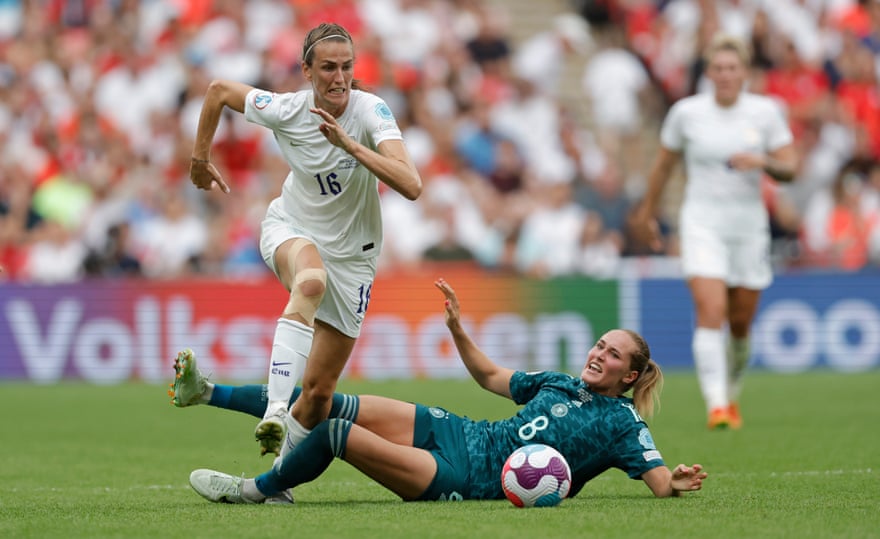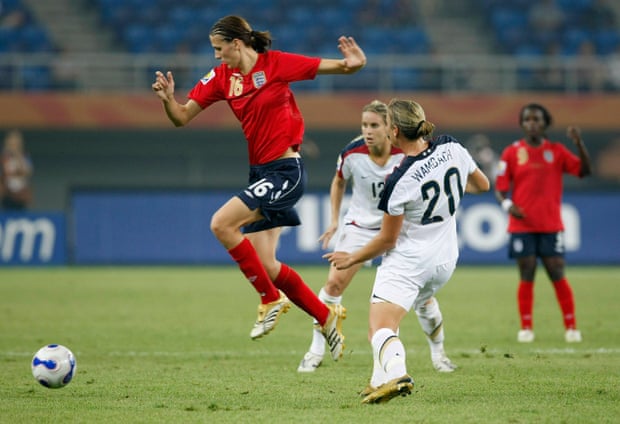We have just moved into our second hour of talking when Jill Scott remembers that her longest interview stretched across six hours. It was also different because, while driving alone years ago, Scott interviewed herself out loud. “I always did,” she says as she shows her exuberant character which meant that, even at the grand old age of 35, she was one of the stars of England’s European triumph this summer.
Scott retired last month after the last of her 170 international appearances (nine of which were for Great Britain) came in the Euro 2022 final when she left the bench and helped England to beat Germany. She also lit up social media when she was seen on television swearing at a German player as she displayed the trademark grit and passion of a long career which stretched from unpaid obscurity as a young footballer on Wearside to a European champion at Wembley.
Now Scott is simply having a hoot remembering how she interviewed herself on her sister’s wedding day. Late that afternoon, in 2007, Scott drove for six hours from Sunderland to London because the following day she was due to play for Everton against Charlton in the FA Cup. “Straight after the wedding and I couldn’t even stay for the first dance. I got in the car in my dress with my hair all pinned up because I’d been bridesmaid. The radio didn’t work so I interviewed myself on that journey, all the way down. I entertained myself: ‘Jill, you’ve got a really big game tomorrow. How are you feeling?’ I was practising my interviewing skills.”
The day after England won the European Championship the hungover squad were taken on a parade through London. Scott laughs when I remind her she actually interviewed the trophy as she indulged in the surreal celebrations. But she makes it plain that coaching, rather than media work, is far more likely to consume her.
“That’s where I get my buzz and my happiness, on that pitch coaching. I would run myself into the ground as a coach so I don’t want to throw myself into it straight away. Football has always been my purpose but being happy is the main thing.”
Scott felt happier and prouder than ever this summer during her 10th major tournament. She played in four World Cups, four European championships and at two Olympic Games. “I’ve soaked up every single moment and made the most of every tournament. They define my life.”
Yet Scott harboured serious doubts that she would be picked for Euro 2022. “I thought it could go either way. Them last two years at Manchester City were really difficult and I went out on two loans [back to Everton and then to Aston Villa]. I was actually proud of myself because I contributed to both teams. But at Villa I pushed too hard. I was doing extra sessions and extra running. I blew my knee up a little and that added to the doubts.”
Scott was shaking when she went into a meeting with Sarina Wiegman, the England manager, to hear whether she had made the squad. “It was horrible. Some people were getting good news, some were getting bad news. I hate knowing that some people are going to be upset. So I was happy that I got in but so sorry for everyone who didn’t make it.”
The veteran midfielder’s importance to the balance and harmony of the squad was evident throughout Euro 2022 but Scott believes Wiegman provided the best possible environment. “She’s a really good person. You’d be having a coffee and she would sit and chat for an hour and you felt like you were talking to a friend. But as soon as you got on that training pitch you didn’t want to put a foot wrong. You didn’t want to disappoint her. I felt we were the best-prepared team and we all knew our job. Going into the tournament I knew I would be used if we had a lead and it all went according to a very well‑worked‑out plan.”
In the final Scott was a key figure during extra time. She was typically competitive and swore memorably at Germany’s Sydney Lohmann. “I don’t like to swear usually but I did in that moment. She had my leg trapped between hers and she wouldn’t give us my leg back while the game’s going on. She also said something to me and I just reacted. Unfortunately the camera caught it. I was so glad we won, because that could have been a negative.”

Her grandmother in Sunderland has been given mugs and T-shirts which have Scott’s profanity printed on them. Scott laughs. “She understands this is my passion and how I am on the pitch. I like to think I was quite horrible to play against and my idol growing up was Roy Keane.”
Keane had a successful managerial stint at Sunderland, the club Scott has always supported, and she went to watch them against Norwich last month. “They didn’t have a manager at the time and when I got to the ground lots of people asked for pictures and a few said: ‘Go and get the manager’s job.’”
Scott becomes more serious as she imagines coaching at the Sunderland academy one day. “I’d love to do some coaching there and this isn’t me being big-headed. I could add some value, especially having been around environments like Manchester City and Everton and seeing how their men’s teams work. At their academies I was invited to sit in on meetings and watch video footage.”
She picks out Pep Guardiola and Jürgen Klopp as the two coaches she admires most. “Pep’s philosophy of trying different things is special. You see his full‑backs taking the inside space or central midfielders like Foden and Silva playing as inverted wingers. I love that about Pep because you can learn so much – even if he’s such a genius you can’t work out how he’s getting to certain places. In terms of attitude and positivity, it’s got to be Klopp. I love him.”
Did she talk to Guardiola in detail at City? “No, but I went to a couple of his training sessions, which was great, and he came to watch some of ours. But it was intimidating knowing that Kevin De Bruyne was watching us as well. I was playing as a 10 and thought: ‘Oh, it’s a lot of pressure!’ But Kevin has since come a few times to the coffee shop that me and [her fiancée] Shelley own. They’re nice guys.”
Scott has been coaching young players for years and obtained her Uefa B licence. She plans to take her A licence and nods when I ask whether she has been approached about possible coaching positions. “There’ve been some talks with a couple of clubs but I really want to get involved in England, with the younger age groups. I think that mentoring role is so important.”
Has the FA spoken to her? “They have asked us for a couple of meetings this week. I think I’m just creating a job.”
Scott laughs but her experience is vast and it spans the transformation in women’s football over 30 years. She began playing football at the age of five and a few years later, as she remembers: “I was playing for a boys’ team, got awarded man of the match, and they asked if they should change it to player of the match. I said no, because I didn’t want anyone to think I got it for being the only girl. Then, the next season, when I was told I couldn’t play with the boys any more, I was really upset.”
Her mum encouraged her to keep playing and promised they would find her a girls’ team. “I was addicted to football. I wanted to play it all the time.”
Scott recalls playing for Sunderland Women, in the over‑sized kit the men’s team had handed down from the previous season and how, on away trips, they shared four to a room at a Premier Inn: “They were the best days.”
But women’s football had little chance to develop then and even the top women’s clubs trained in the evening only, usually from six until nine, because most players worked in the day. “At Everton, Mo Marley [her coach] could keep you there till 11. I’d have to drive back to Sunderland and wouldn’t get back until two in the morning. It was tough getting up for coaching.”
She earned a little money coaching at Gateshead College and, as Scott says: “We didn’t get paid for club football in the early days. But I got lucky.”

She made her international debut in 2006, aged 19, and three years later she was among the first 17 players to be awarded a central contract by the FA. “I was on £16,000 [a year] which was absolutely amazing. You had players doing this for years that didn’t have any money at all. I felt very fortunate.”
Scott also felt fortunate, and elated, throughout the Euro 2022. “Spain were absolutely brilliant” in their quarter-final but she always believed England would prevail. It was only in the final that nerves engulfed her on the bench. “Think about all you’ve ever wanted as an England fan, as an England player and a little girl wearing your England shirt. All those years came down to that one match and I was trying to calm myself: ‘Come on, Jill, stay logical. All your past experience will help you.’ It was almost too big an occasion and I was really nervous. But as soon as I knew I was going on, something switched. When I crossed that white line, I knew my job was playing football like I’ve done for so many years.”
Has women’s football changed forever in England? “Definitely. For years you had to use such unnecessary energy to justify the sport. But we’ve finally been able to focus most of our energy on just training and playing. The momentum from these tournaments usually dies down but I’m very confident it’ll keep rising now.”

She has become an ambassador for Starling Bank, which has launched another campaign to increase investment in grassroots women’s football. “Starling are offering £1,000 grants to 25 grassroots teams, which is brilliant in terms of using it for kit, travel. I also wanted to link up with them because Starling were founded by a woman, Anne Boden, who wanted to break barriers in banking. They now want to break barriers in women’s football.”
Scott’s gratitude in retirement does not feel bitter-sweet. “It’s been a massive part of my life with 30 years of only knowing football on a weekend. But I’m going to stay involved in the game and that will help the transition. The Lionesses invited us to training last week and it was brilliant. It was only the third camp I hadn’t been on in 16 years. They invited us for lunch and I stayed till dinner. I wanted to see everyone so bad.”
The dream of coaching will also sustain Scott. “Sometimes, at night,” she says, “I’ll be watching Bayern Munich’s passing drills and I’ll be so happy. So I have a real passion for coaching and, when the time is right, I’ll be all in.”
www.theguardian.com
George is Digismak’s reported cum editor with 13 years of experience in Journalism